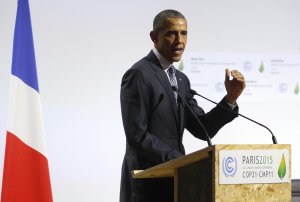By Vivian Chu | Web Editor
This year marks a significant turning point in climate change policy. Recently, President Obama vetoed construction of the Keystone XL pipeline, which would move over 800,000 barrels of petroleum from Canadian oil sands through Nebraska to refineries in the Gulf Coast daily. His decision, which came after eight long years of debate, coincided with objections from the Environmental Protection Agency. The EPA reported that the pipeline would come with increased risk of oil spills and greenhouse gas emissions, affecting drinking water and nearby ecosystems. In further expansion of awareness, China agreed to cap its emissions and push to increase use of zero-emissions energy sources to 20 percent by 2030 in the US-China Emissions Agreement. The US also pledged to cut its emissions to 26-28 percent below 2005 levels by 2025.
Increasing international awareness about climate change, participants in the UN Climate Change Conference, which began Nov. 30 in Paris, hope to achieve new legally binding and universal agreements to keep global temperatures from rising more than 2 degrees Celsius from pre-industrial levels. Representatives from 196 nations will review the reductions in emissions of greenhouse gases that each country has pledged to achieve by 2020 and resolve conflict regarding distribution of cuts between developed and underdeveloped countries. With this, more people will finally come to terms with the cost of climate change and move towards realistic goals in capping emissions.






